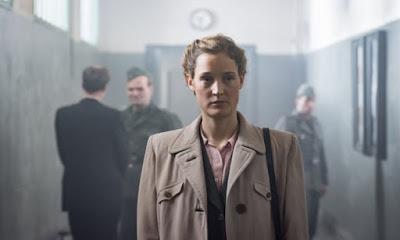 There are many obvious horrors in this new adaptation of Das Boot, which departs very far from the original 1981 film Das Boot. Like its predecessors, it draws from the sheer claustrophobic terror of being stuck on something that can so easily turn from a weapon into a grave, from all the ways in which the men on the show’s titular U-612 can slowly or suddenly die. There’s drowning, fire, amputation, asphyxiation, sudden illness. There’s the much used horror of a group of people from diverse backgrounds and in this case especially, differing levels of ideological fervour and dedication to Nazi ideology, being stuck together in an extreme situation in which the inevitable moment of mutual betrayal will always come sooner or later (in this case, it’s a mutiny and later, the execution of one of their crew mates). If it were only that for the length of a season of television, Das Boot wouldn’t be much different from Vincenzo Natali’s 1997 classic horror film Cube – it doesn’t much matter what brought upon the situation in which these men are stuck together in a hostile environment that offers no possible escape, only that their defective moral compass and lack of empathy will lead them to tear each other apart after running out of outsiders to violate and murder. Das Boot somehow accomplishes to sustain that claustrophobic horror of disintegrating humanity under pressure while still showing an outside – and outside that gives a glimpse of the mechanisations that have landed these young men on board the submarine in the first place. We follow Oberfunkmaat Frank Strasser (Leonard Schleicher) into what is often filmed as a descent into a figurative hell, into a chaotic purgatory of hard-to-parse German and Austrian regional accents, crude jokes and the closeness of complete strangers who must rely on each other to survive, but can’t, while his sister Simone Strasser (an outstanding Vicky Krieps) navigates the political maze of the submarine base in La Rochelle. Their status as not-quite-Germans, suspect because of their birth in then-French Alsace-Lorraine, puts them on the outside in both of their environments, even if Simone has made her fluency in the language of the now-occupied French her career.
There are many obvious horrors in this new adaptation of Das Boot, which departs very far from the original 1981 film Das Boot. Like its predecessors, it draws from the sheer claustrophobic terror of being stuck on something that can so easily turn from a weapon into a grave, from all the ways in which the men on the show’s titular U-612 can slowly or suddenly die. There’s drowning, fire, amputation, asphyxiation, sudden illness. There’s the much used horror of a group of people from diverse backgrounds and in this case especially, differing levels of ideological fervour and dedication to Nazi ideology, being stuck together in an extreme situation in which the inevitable moment of mutual betrayal will always come sooner or later (in this case, it’s a mutiny and later, the execution of one of their crew mates). If it were only that for the length of a season of television, Das Boot wouldn’t be much different from Vincenzo Natali’s 1997 classic horror film Cube – it doesn’t much matter what brought upon the situation in which these men are stuck together in a hostile environment that offers no possible escape, only that their defective moral compass and lack of empathy will lead them to tear each other apart after running out of outsiders to violate and murder. Das Boot somehow accomplishes to sustain that claustrophobic horror of disintegrating humanity under pressure while still showing an outside – and outside that gives a glimpse of the mechanisations that have landed these young men on board the submarine in the first place. We follow Oberfunkmaat Frank Strasser (Leonard Schleicher) into what is often filmed as a descent into a figurative hell, into a chaotic purgatory of hard-to-parse German and Austrian regional accents, crude jokes and the closeness of complete strangers who must rely on each other to survive, but can’t, while his sister Simone Strasser (an outstanding Vicky Krieps) navigates the political maze of the submarine base in La Rochelle. Their status as not-quite-Germans, suspect because of their birth in then-French Alsace-Lorraine, puts them on the outside in both of their environments, even if Simone has made her fluency in the language of the now-occupied French her career. One way of reading this season would be as both Simone and Frank descending into hell and then emerging, at the end, broken and changed. Frank bears witness to his own crew mutinying against a captain whose main aim, throughout his story, is to figure out how to lead his men in a fashion that protects them from the harm that can come from ideological absolutism. Klaus Hoffmann (Rick Okon) does so while bearing the burden of having a famous and heroic father, and coming into his post by way of birth, rather than talent. It makes him suspect to the career officers on board, and his struggle to connect to his crew, and to shake the suspicion that he believes himself to be above them, costs him almost everything in the end. Das Boot questions loyalty at every turn, even where the sailors who keep the boat running cannot afford to really thing about their situation, and blindly repeat both superstitions and Nazi ideology. Hoffman wants to be a good captain for his men but finds that this is impossible in this particular war, in which nobody on this side of the fight can claim good intentions (where he ends up in the last episode is all the more fitting). Both storylines have a moment where a character prophesies how the war will end, and how none of these sacrifices will matter in the end, because they were given for an evil cause. In Frank’s case, an American hostage, who will soon be exchanged for a man who will bring nothing but death and destruction upon the crew, explains precisely who will win the war, and who will profit in the end. Samuel Greenwood (Vincent Kartheiser finding his niche, playing a not-too-unsimilar role in the second season of Brit Marling’s and Zal Batmanglij's The OA), who becomes the focus point of all of the crew’s hatred, for his open cynicism, explains that none of the blind idealism that the men show means anything, and that their hatred and ideology is meaningless and only exists so that they may die for something that will gain them nothing. Soon, they while he is eating his steak and returning to the wealth of New York, the men will narrowly escape death after betraying their captain, many of them will die, they will encounter the true horrors of war when they find themselves aboard a ghost ship, losing any pretense of glory and honor. The camaraderie that is meant to edify them will lead to the slaughter of the closest the show has to an innocent man, if only for his incapability to comprehend the situation he finds himself in.
But the other story that Das Boot tells is, in a way, even more claustrophobic, even if it so in a less literal way than the submarine, which keeps its crew suspended between life and death. Because Frank is shipped off unexpectedly, he is unable to finish his business in La Rochelle, and his sister finds herself in a spy thriller on the first day of assuming her post. The way the story unrolls – Simone Strasser, an innocent woman with no political consciousness, stumbling into a world of intrigue – seems so close to things that we have seen so many times before – there are hushed meetings, shadows, shots fired, the echoes of heels running through the night – and yet, the story gets subverted brilliantly. The hard-boiled cynic that Simone encounters as she discovers the mysteries of her brother’s life is played by Lizzy Caplan, and her Carla Monroe is the perfect foil for Simone’s initial innocence, which is really in the context of this story, ignorance. Simone discovers that her brother was attempting to exchange details of the submarine’s communication system for forged papers for his Jewish partner and their child, and that she is dealing with the French resistance. Monroe is a veteran of the Spanish civil war, and sees in her an even greater opportunity to gain access to German military secrets, especially when Simone catches the eye of Hagen Forster, a Gestapo officer tasked with destroying French resistance to German occupation. This is at least how it starts, but then things twist and turn. Simone’s quietness suddenly turns into something she may have assumed for self-preservation, when the way that her attention focuses on women (first, her housemate) is clarified after she ends up in bed with Monroe. Das Boot is open about the fact that what Simone ends up doing in the following episodes, risking her own life again and again, is an act of love, but it never clarifies if Carla Monroe is only using her, if there is even space for any kinds of feelings in the struggle she is fighting against the Nazis. They are both up against an opponent who has a tally about how many French civilian lives that of a German officer is worth, a man who does not hesitate to torture women to death, to execute innocent civilians. Carla’s willingness to ask Simone to go further and further, and to perhaps use her feelings for her to motivate her, appears to be the result of a world where any kind of genuine affection without other intentions has been undermined by a struggle against evil itself. Carla is the one who delivers the second prophecy on the show, one in which none of this will matter in the end because the Nazis will lose the war – that it doesn’t matter how willing she is to kill civilians for her cause, because her methods are justified by her goal to destroy fascism, and history will redeem her. She will lose her own life as well, to the man that this prediction is delivered to, but to her, it won’t matter. In the end, the one clear, personified villain that Das Boot has – Forster – will be made weak and ineffective by a woman he has never taken seriously as a person (and Simone is given the chance of a take-down of him, robbing him of all allusions of grandeur, exposing him not only as a rapist but also as a man whose power will vanish utterly soon). In the end, everyone is broken, and both Simone and Frank have lost everything safe for each other, but at least, their eyes are open.

